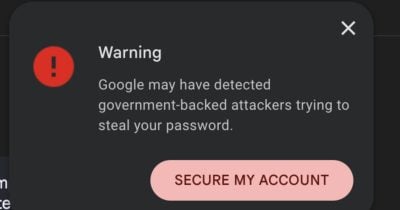The developer behind Eyes Up, one of the many Immigration and Customs Enforcement-related apps removed by Apple in recent days, was busy on Wednesday evening at a local planning session for the nationwide “No Kings” protest, scheduled for later this month. When WIRED eventually reached him by phone, he asked to be only identified by his first name, Mark, for safety reasons. “The administration will act on their grudges,” he says. “And they are not afraid to do so, frequently.”
He should know.
Mark’s app, a platform built to serve as a repository for videos and other materials documenting ICE activity, is not alone in getting kicked off Apple’s App Store. Earlier in October, ICEBlock was among the first ICE-related apps Apple removed. The decision followed claims from US attorney general Pam Bondi that such tools endanger ICE officers. Apple has also removed other tracking apps—including Red Dot and DEICER—as well as Eyes Up.
Like Mark, ICEBlock’s developer, Joshua Aaron, is determined to reverse the app store bans. “While I cannot speak to specifics right now, I can tell you that ICEBlock has an incredible legal team behind it and we are going to do everything in our power to fight this,” Aaron tells WIRED.
Apple did not respond to WIRED’s requests for comment.
Regarding Eyes Up, Mark says he has already appealed Apple’s decision to delist the app, twice.“I will appeal every single time they reject me, until it’s back in the App Store,” he says. “Because it’s pure cowardice, what they’re doing. I’m not gonna let off the gas with Apple.”
The ban ignited a fire under Mark, who’s performing more community outreach to let people know about Eyes Up and encouraging them to upload publicly documented encounters with ICE agents to the app, which is still currently available on the Google Play store and the Eyes Up website.
Rafael Concepcion, who was previously a professor at Syracuse University, first designed DEICER to be a “rights app,” with the ICE-location map added on as an accountability tool. Concepcion was heavily inspired by musician Peter Gabriel and his WITNESS organization, started in the 1990s, that documented human rights violations. While gone from Apple’s App Store, DEICER is also still available via Google Play and a website.
While Apple has not yet commented on its decisions to remove ICE monitoring apps from the App Store, Migrant Insider reported this week that in the case of the DEICER iOS app, the company justified removal under a developer guideline that prohibits “defamatory, discriminatory, or mean-spirited content” toward “religion, race, sexual orientation, gender, national/ethnic origin, or other targeted groups.” Google, which has also removed ICE monitoring apps in recent days, told 404 Media last week that it also considers ICE officers to be a vulnerable group.
Google did not immediately respond to a request for comment.
Tools that include a law enforcement monitoring or transparency mechanism are not unprecedented in mobile apps, though. In fact, Apple and Google both develop apps with these features. The driving directions and traffic app Waze—which is owned by Google and can also be downloaded for iOS—has long offered a crowdsourced tool for reporting and receiving alerts about police sightings on public roads. Apple Maps and Google Maps offer similar features.
“I am not in favor of Apple removing ICE-tracking apps from the App Store, nor the app that simply let users archive videos of ICE,” says Riana Pfefferkorn, a policy researcher at Stanford University. “This seems like more needless kowtowing by Tim Cook.” The Apple CEO has appeared at several events with President Donald Trump and reportedly donated $1 million to attend his inauguration.
Legal experts WIRED spoke with say that the ICE monitoring and documentation apps that Apple has removed from its App Store are clear examples of protected speech under the US Constitution’s First Amendment. “These apps are publishing constitutionally protected speech. They’re publishing truthful information about matters of public interest that people obtained just by witnessing public events,” says David Greene, a civil liberties director at the Electronic Frontier Foundation.
This hasn’t stopped the Trump administration from attacking the developers behind these ICE-related apps. When ICEBlock first rose to a top spot in Apple’s App Store in April, the Trump administration responded by threatening to prosecute the developer. “We are looking at him,” Bondi said on Fox News of ICEBlock’s Aaron. “And he better watch out.”
Neither the White House nor ICE immediately responded to requests for comment.
Digital rights researchers say that the situation illustrates the dangers when key platforms and communication channels are centrally controlled—whether directly by governments or by other powerful entities like big tech companies. Regardless of what is officially available through the Google Play store, Android users can sideload apps of their choosing. But Apple’s ecosystem has always been a walled garden, an approach that the company has long touted for its security advantages, including the ability to screen more heavily for malicious apps.
For years, a group of researchers and enthusiasts have tried to create “jailbreaks” for iPhones to essentially hack their own devices as a way around Apple’s closed ecosystem. Recently, though, jailbreaking has become less common. This is partly the result of advances in iPhone security, but partly related to the trend in recent years of attackers exploiting complex chains of vulnerabilities that could potentially be used for jailbreaking for malware instead, particularly mercenary spyware.
“The closed ecosystem motivation sort of dwindled as Apple added capabilities that previously required a jailbreak—like wallpapers, tethering, better notifications, and private mode in Safari,” says longtime iOS security and jailbreak researcher Will Strafach. “But this situation with ICE apps highlights the issue with Apple being the arbiter and single point of failure.”
Stanford’s Pfefferkorn warns that while US tech companies are not state-controlled, they have in her view become “happy handmaidens” when it comes to “repressing free speech and dissent.”
“It’s especially disappointing,” Pfefferkorn says, “coming from the company that brought us the Think Different ad campaign, which invoked MLK, Gandhi, and Muhammad Ali—none of whom would likely be big fans of ICE today.”



